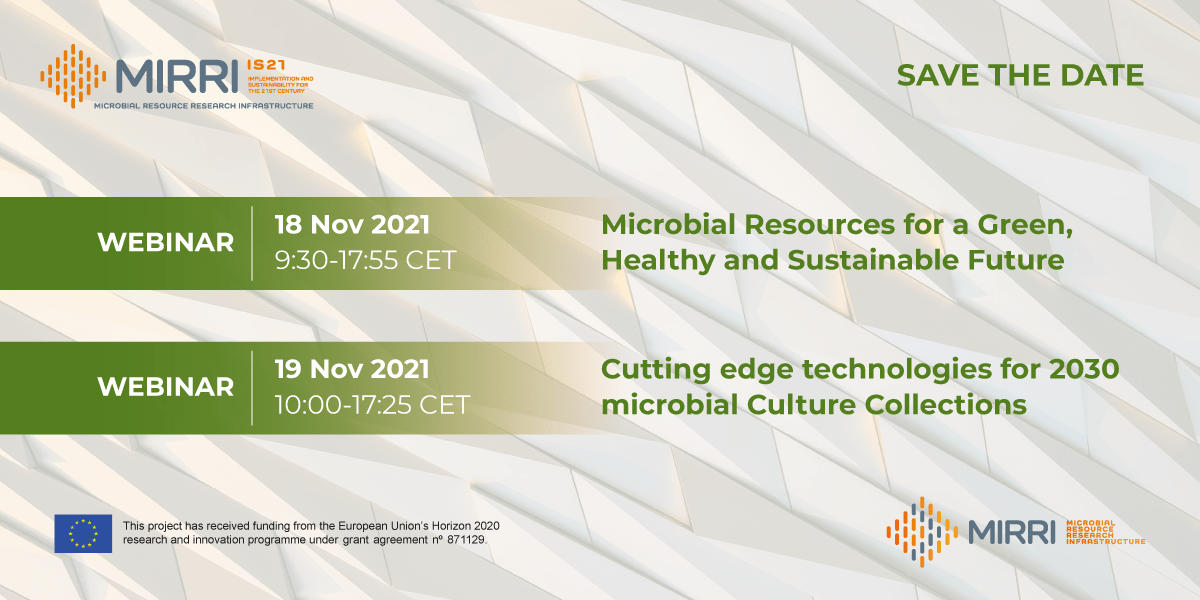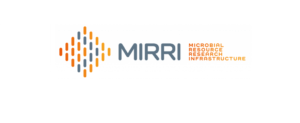
MIRRI WEBINARS: Microbial resources for a Green, Healthy and Sustainable future & Cutting-edge technologies for 2030 microbial Culture Collections
MIRRI, as a pan-European Research Infrastructure, will dedicate the decade ahead to applying microbial resources and cutting-edge technologies for research and innovation in Health & Food, Agro-Food, and Environment & Energy through its Strategic Research & Innovation Agenda (SRIA) and the capacities of its partner organisations. Through its broad, multidimensional, and multidisciplinary characteristics, MIRRI is a single point of access to high-quality microbial resources, data, services, expertise, and higher training designed to meet the needs and expectations of European and global innovators in biosciences and biotechnology.
Webinar 1 | Microbial resources for a green, healthy and sustainable future
MIRRI is capable of enabling and supporting the development of innovative solutions by scientific and entrepreneurial communities in Europe and beyond. In this webinar, participants will learn about MIRRI’s SRIA and how it anticipates future research, innovation and market trends/opportunities on its seven strategic areas. For each area, the capacities of MIRRI and its partner organisations will be evidenced through concrete examples, including projects and success stories. Opportunities for future collaboration between participants and MIRRI will be explored, including the mapping of funding opportunities that will be available under the Horizon Europe clusters on Health, and on Food, Bioeconomy, Natural Resources, Agriculture and Environment.
Date: 18 November 2021, 09:30 – 17:55 CET
Agenda
09:30 – 09:40 | Opening & Introduction to MIRRI’s Strategic Research & Innovation Agenda 2021-2030, Luís Soares (MIRRI)
09:40 – 10:00 | Keynote address – The relevance of Research Infrastructures to the new European Research Area and for delivering the impacts of Horizon Europe, Dominik Sobczak (European Commission; ESFRI)
10:05 – 10:20 | MIRRI’s Strategic Area 1 | Research on pathogenic microorganisms and human / human-animal infectious diseases, Sylvain Brisse (Institut Pasteur)
10:20 – 10:27 | The participation of MIRRI to Horizon Europe: the ISIDORe project, Raquel Hurtado-Ortiz (Institut Pasteur)
10:28 – 10:35 | The participation of MIRRI to Horizon Europe: the BY-COVID project, Paolo Romano (USMI)
10:40 – 10:55 | MIRRI’s Strategic Area 2 | Research & Development of new (bio) pharmaceuticals / therapeutic solutions (including antimicrobials, vaccines, phage therapies and microbiome therapeutics – for human use), Nelson Lima (MUM/UMinho)
10:55 – 11:10 | Current status of microalgae as a source of biologically active compounds, Juan Luis Gomez (BEA)
11:15 – 11:45 | Horizon Europe | Cluster Health, Virginie Sivan (NCP-France, MESRI)
11:45 – 12:00 | Question & Answers
Lunch Pause
14:00 – 14:15 | MIRRI’s Strategic Area 3 | Research & Development of new, safe, healthy and sustainable food and feed products, Rosa Aznar (CECT/UVEG)
14:15 – 14:30 | Microbial BRCs in support of the ecological transition to sustainable and healthy food products, Michel-Yves Mistou (INRAe-CIRM)
14:35 – 14:50 | MIRRI’s Strategic Area 4 | Resources and methods for biological management of soils and crops, Paris Laskaris (NKUA)
14:50 – 15:05 | Arbuscular mycorrhizal fungi: key organisms for improving crop production, Stéphane Declerck (BCCM-MUCL)
15:10 – 15:25 | MIRRI’s Strategic Area 5 | Resources and methods for biomonitoring and/or bioremediation of microbial pathogens, persistent organic pollutants and plastics in soils and waters, Cristina Varese (UNITO)
15:25 – 15:40 | Collaborative work experience in the field of oil bioremediation with industrial partners, Maria Kuyukina (PFRC UB RAS)
Coffee break
15:55 – 16:10 | MIRRI’s Strategic Area 6 | Research & Development of renewable biobased chemicals, materials and bioenergy sources, Craig Faulds (INRAe CIRM-CF)
16:10 – 16:25 | Bioconversion of lignin derived aromatics compounds into platform chemicals, Ronald de Vries (KNAW)
16:30 – 16:45 | MIRRI’s Strategic Area 7 | Rescuing and preserving microbial biodiversity, Gerard Verkleij (KNAW)
16:45 – 17:00 | Preserving yeast diversity from worldwide endangered cold habitats in the era of climatic change: scenarios and challenges, Benedetta Turchetti (DBVPG)
17:05 – 17:35 | Horizon Europe | Cluster Food, Bioeconomy, Natural Resources, Agriculture and Environment, Marta Conde Vidal (NCP-Spain, CDTI)
17:35 – 17:50 | Question & Answers
17:50 – 17:55 | Concluding remarks & Closing, Luís Soares (MIRRI)
***
Webinar 2 | Cutting-edge technologies for 2030 microbial Culture Collections
The microbiome revolution is a challenge for culture collections. In this webinar, participants will be presented issues and possible strategies for microbiota conservation, culturomics methods for the isolation of microorganisms, tools and methods for high-throughput characterization with MALDI-TOF, and genomics for the ultimate characterization of microorganisms.
Date: 19 November 2021, 10:00 – 17:25 CET
Agenda
10:00 – 10:05 | Welcome, Jean-Luc Legras (INRAe CIRM-Levures)
MicrobiotA conservation and characterization
10:05 – 10:35 | Microbial Resource Centres and the Microbiome Challenge, Matthew Ryan (CABI)
10:35 – 11:05 | The DZIF Pathogen Repository, Thomas Riedel (DSMZ)
11:05 – 11:25 | The Microstore project: Effects of preservation on taxonomic composition and functional diversity of microbial communities, Perrine Portier (INRAe CFBP)
11:30 – 12:00 | UNLOCK – integrated biodiscovery-, bioreactor- and FAIR data facilities to unlock microbial diversity for society, Hauke Smidt (U Wageningen)
12:00 – 12:30 | Flow Cytometry for targeted culturomics of complex ecosystems species, Vincent Thomas (BioAster)
12:30 – 12:45 | Question & Answers
Lunch Pause
MALDI-TOF
14:00 – 14:30 | MALDI-TOF MS: building of a database, use for QC and culturomics projects @BCCM/LMG, Anneleen Wieme (BCCM/LMG)
14:30 – 14:50 | Klebsiella MALDI-TyperR, an identification web tool based on species-specific MALDI-TOF biomarkers, Sylvain Brisse (Institut Pasteur)
14:50 – 15:10 | Towards a universal and community-based MALDI-TOF database and identification system, Vincent Robert (KNAW; Bioaware)
15:10 – 15:25 | Question & Answers
Genomics
15:30 – 16:00 | Evolutionary Genomics as a tool for studying fungal diversity and revising taxonomy, Antonis Rokas (Vanderbilt Univ, Nashville)
16:00 – 16:30 | Genomics for the characterization of Lactobacillus diversity and taxonomy, Sarah Lebeer (U Antwerpen)
16:30 – 17:00 | Genomic libraries to catalogue and analyse strain biodiversity within bacterial species: perspectives for mBRCs, Federica Palma (Institut Pasteur)
17:15 – 17:25 | Question & Answers
17:25 – 17: 25 | Concluding remarks, Jean-Luc Legras (INRAe CIRM-Levures)
Registration
Registration for both webinars is free but compulsory in order to receive the links and updates prior to the event. Registration is open until the launch of the events.
You can register for either or both events here: Webinar MIRRI 2021 – registration
Contact us
For any additional information, please contact us at: jean-luc.legras@inrae.fr; tedoraaibu@spi.pt.


